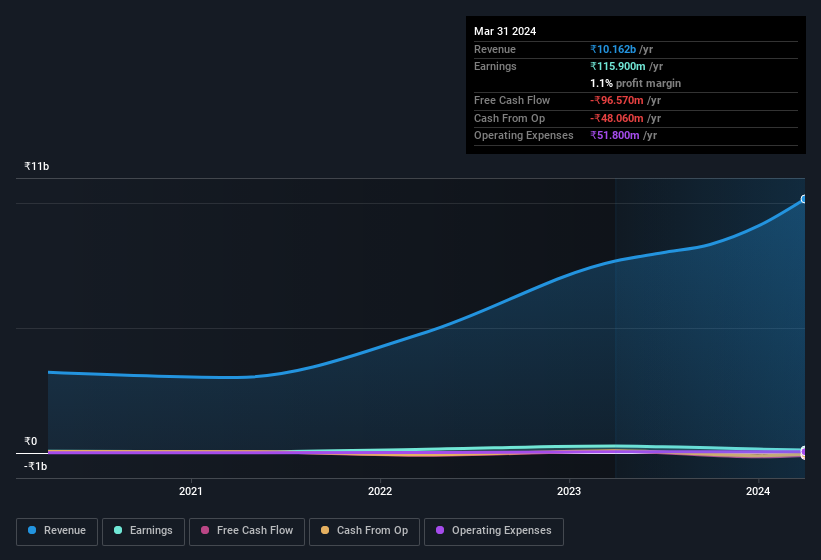- India
- /
- Professional Services
- /
- NSEI:SPECTSTM
We Think That There Are More Issues For Spectrum Talent Management (NSE:SPECTSTM) Than Just Sluggish Earnings
Investors were disappointed by Spectrum Talent Management Limited's (NSE:SPECTSTM ) latest earnings release. We did some further digging and think they have a few more reasons to be concerned beyond the statutory profit.
Check out our latest analysis for Spectrum Talent Management

A Closer Look At Spectrum Talent Management's Earnings
In high finance, the key ratio used to measure how well a company converts reported profits into free cash flow (FCF) is the accrual ratio (from cashflow). In plain english, this ratio subtracts FCF from net profit, and divides that number by the company's average operating assets over that period. This ratio tells us how much of a company's profit is not backed by free cashflow.
As a result, a negative accrual ratio is a positive for the company, and a positive accrual ratio is a negative. While having an accrual ratio above zero is of little concern, we do think it's worth noting when a company has a relatively high accrual ratio. Notably, there is some academic evidence that suggests that a high accrual ratio is a bad sign for near-term profits, generally speaking.
Spectrum Talent Management has an accrual ratio of 0.33 for the year to March 2024. We can therefore deduce that its free cash flow fell well short of covering its statutory profit, suggesting we might want to think twice before putting a lot of weight on the latter. Over the last year it actually had negative free cash flow of ₹97m, in contrast to the aforementioned profit of ₹115.9m. It's worth noting that Spectrum Talent Management generated positive FCF of ₹71m a year ago, so at least they've done it in the past. Importantly, we note an unusual tax situation, which we discuss below, has impacted the accruals ratio. This would partially explain why the accrual ratio was so poor.
Note: we always recommend investors check balance sheet strength. Click here to be taken to our balance sheet analysis of Spectrum Talent Management.
An Unusual Tax Situation
Moving on from the accrual ratio, we note that Spectrum Talent Management profited from a tax benefit which contributed ₹16m to profit. This is of course a bit out of the ordinary, given it is more common for companies to be paying tax than receiving tax benefits! Of course, prima facie it's great to receive a tax benefit. However, the devil in the detail is that these kind of benefits only impact in the year they are booked, and are often one-off in nature. In the likely event the tax benefit is not repeated, we'd expect to see its statutory profit levels drop, at least in the absence of strong growth. So while we think it's great to receive a tax benefit, it does tend to imply an increased risk that the statutory profit overstates the sustainable earnings power of the business.
Our Take On Spectrum Talent Management's Profit Performance
This year, Spectrum Talent Management couldn't match its profit with cashflow. If the tax benefit is not repeated, then profit would drop next year, all else being equal. For the reasons mentioned above, we think that a perfunctory glance at Spectrum Talent Management's statutory profits might make it look better than it really is on an underlying level. If you'd like to know more about Spectrum Talent Management as a business, it's important to be aware of any risks it's facing. When we did our research, we found 3 warning signs for Spectrum Talent Management (1 shouldn't be ignored!) that we believe deserve your full attention.
In this article we've looked at a number of factors that can impair the utility of profit numbers, and we've come away cautious. But there is always more to discover if you are capable of focussing your mind on minutiae. For example, many people consider a high return on equity as an indication of favorable business economics, while others like to 'follow the money' and search out stocks that insiders are buying. So you may wish to see this free collection of companies boasting high return on equity, or this list of stocks with high insider ownership.
New: Manage All Your Stock Portfolios in One Place
We've created the ultimate portfolio companion for stock investors, and it's free.
• Connect an unlimited number of Portfolios and see your total in one currency
• Be alerted to new Warning Signs or Risks via email or mobile
• Track the Fair Value of your stocks
Have feedback on this article? Concerned about the content? Get in touch with us directly. Alternatively, email editorial-team (at) simplywallst.com.
This article by Simply Wall St is general in nature. We provide commentary based on historical data and analyst forecasts only using an unbiased methodology and our articles are not intended to be financial advice. It does not constitute a recommendation to buy or sell any stock, and does not take account of your objectives, or your financial situation. We aim to bring you long-term focused analysis driven by fundamental data. Note that our analysis may not factor in the latest price-sensitive company announcements or qualitative material. Simply Wall St has no position in any stocks mentioned.
About NSEI:SPECTSTM
Spectrum Talent Management
Provides manpower solutions in India and internationally.
Mediocre balance sheet and slightly overvalued.
Similar Companies
Market Insights
Weekly Picks

Solutions by stc: 34% Upside in Saudi's Digital Transformation Leader


The AI Infrastructure Giant Grows Into Its Valuation
Recently Updated Narratives

Perdana Petroleum Berhad is a Zombie Business with a 27.34% Profit Margin and inflation adjusted revenue Business
Many trends acting at the same time


Engineered for Stability. Positioned for Growth.
Popular Narratives


MicroVision will explode future revenue by 380.37% with a vision towards success


NVDA: Expanding AI Demand Will Drive Major Data Center Investments Through 2026



